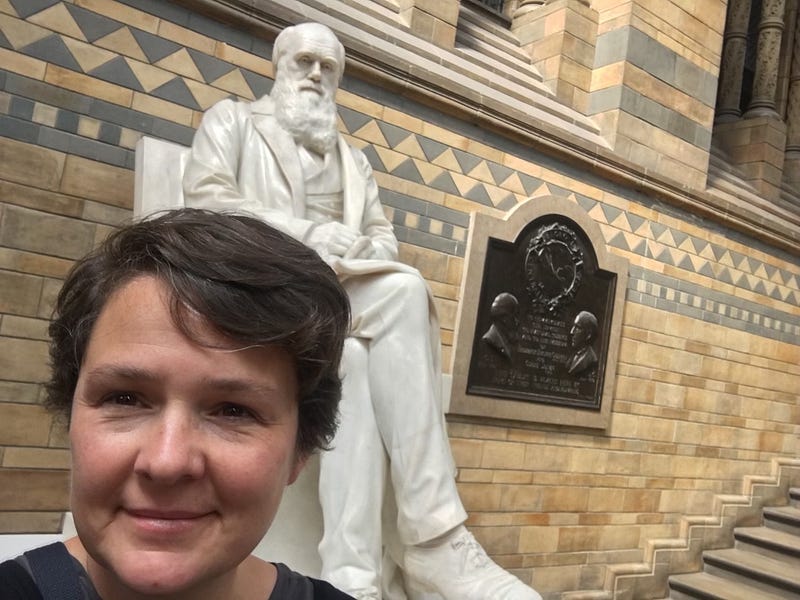# The Myths Surrounding Abortion and the Genius Narrative
Written on
The Fallacy of the Genius Argument
A frequent and misleading claim from staunch anti-abortion advocates is that terminating a pregnancy could eliminate the chance of producing a future genius. The underlying suggestion is that within the embryo or fetus lies the potential for another Darwin or Einstein. This narrative often neglects the contributions and legacies of women, focusing solely on male figures in the realm of genius.
It's crucial to recognize that the concept of a "lone genius" is a myth. Unless we somehow recovered Darwin's DNA from a forgotten artifact and engaged in human cloning, no terminated pregnancy could extinguish a potential future Darwin. The combination of sperm and egg does not dictate genius or any specific outcome. In fact, without intervention, approximately a quarter of pregnancies naturally result in miscarriage. The notion that we might be losing a future genius due to someone's decision to terminate is a misrepresentation, especially when considering the multitude of pregnancies that end without any human choice.
Even if we were able to clone Darwin and nurture that clone to adulthood, the myriad of factors influencing growth and development would prevent us from simply replicating the original. Without recreating the unique historical context of mid-19th-century England, producing an individual with the same genetic material won't yield a new Darwin.
The argument often presented is that abortion negates the possibility of a figure like Charles Darwin emerging in the future. However, this presumption hinges on the flawed belief that significant ideas and societal shifts are the result of individual brilliance rather than collective efforts. Darwin's groundbreaking ideas were not birthed in isolation; they were informed and shaped by the thoughts of numerous individuals. Remarkably, during Darwin's time, there was another thinker on the opposite side of the globe exploring similar concepts of evolution by natural selection. Back then, the world population was around one billion, yet there were already at least two figures akin to Darwin. Today, with nearly 8 billion people on the planet, one might speculate that we could have as many as sixteen potential "Darwins."
Additionally, Darwin's theories emerged not solely from his intellect but through extensive discussions, debates with peers, and the unwavering support of his family, particularly his patient wife. No one achieves greatness alone. Every celebrated genius stands atop the shoulders of others who nurture and cultivate ideas, allowing them to flourish and gain public recognition.
This is significant, as the poet Thomas Gray observed, “Full many a flower is born to blush unseen, And waste its sweetness on the desert air.” Many individuals possess remarkable ideas, capable of blossoming into impactful realities. However, the absence of necessary resources can stifle these potentials. A lack of abortion access often constrains opportunities, leading to adverse outcomes that can ripple across generations, affecting everything from educational attainment to financial stability.
The idea that abortion prevents the emergence of future geniuses is a misconception. The real threat to potential geniuses lies in the imposition of unwanted parenthood on individuals who are unprepared for the responsibilities of raising a child. Moreover, forcing minors, especially those who have been victims of violence, to carry pregnancies to term only exacerbates these challenges.
These harsh realities can severely diminish the prospects of those who are pregnant and limit their capacity to reach their full potential, while also negatively impacting the lives of children born under such circumstances.
Thus, it's time to dismiss the outdated and sexist notion that abortion deprives society of the next great male genius. Those who are genuinely concerned about fostering future intellectuals should focus on ensuring that individuals currently have the resources and support necessary to realize their potential, which includes access to abortion services, thereby allowing them to choose when or if to embrace parenthood.
I am a science journalist and author of The Tailored Brain: From Ketamine, to Keto, to Companionship, A User’s Guide to Feeling Better and Thinking Smarter (lauded as “fantastic and timely” by Salon) and Phallacy: Life Lessons from the Animal Penis (which Pulitzer Prize winner Ed Yong describes as “a hilarious tour through a menagerie of dicks, and a ferocious guide to not being a dick yourself”). You can find me on Twitter @ejwillingham.
Section 1.1 The Impact of Abortion Access on Society
Access to abortion is crucial for the well-being of individuals and society. It allows for the ability to make informed choices about parenthood and can have far-reaching implications for future generations.
Subsection 1.1.1 Understanding the Support Systems

Section 1.2 The Misconception of Individual Genius
The belief that great ideas stem solely from individual brilliance overlooks the collaborative nature of intellectual development and societal progress.
Chapter 2 The Role of Societal Support in Nurturing Potential
In this episode of the Joe Rogan Experience, Tucker Carlson discusses the implications of societal narratives around genius and the importance of supportive environments.
This video explores the significance of Ohio Issue 1 in the upcoming general election, discussing its potential impacts on reproductive rights and the well-being of individuals.